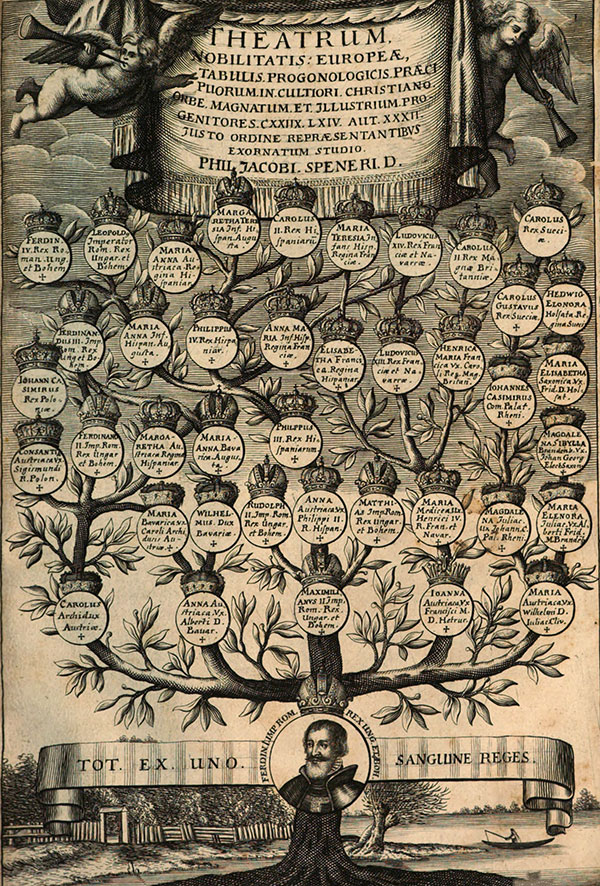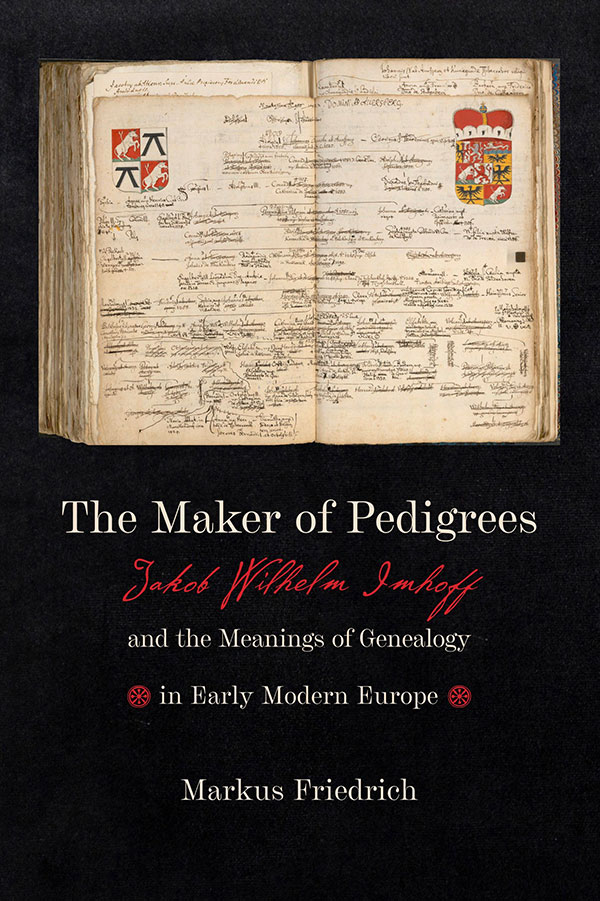Projekte
The Maker of Pedigrees. Jakob Wilhelm Imhoff and the Meanings of Genealogy in Early Modern Europe
(gerade erschienen)
Prof. Dr. Markus Friedrich
A history of genealogical knowledge-making strategies in the early modern world.
In The Maker of Pedigrees, Markus Friedrich explores the complex and fascinating world of central European genealogy practices during the Baroque era. Drawing on archival material from a dozen European institutions, Friedrich reconstructs how knowledge about noble families was created, authenticated, circulated, and published. Jakob Wilhelm Imhoff, a wealthy and well-connected patrician from Nuremberg, built a European community of genealogists by assembling a transnational network of cooperators and informants. Friedrich uses Imhoff as a case study in how knowledge was produced and disseminated during the 17th and 18th centuries.
Family lineages were key instruments in defining dynasties, organizing international relations, and structuring social life. Yet in the early modern world, knowledge about genealogy was cumbersome to acquire, difficult to authenticate, and complex to publish. Genealogy's status as a source of power and identity became even more ambivalent as the 17th century wore on, as the field continued to fragment into a plurality of increasingly contradictory formats and approaches. Genealogy became a contested body of knowledge, as a heterogeneous set of actors—including aristocrats, antiquaries, and publishers—competed for authority. Imhoff was closely connected to all of the major genealogical cultures of his time, and he serves as a useful prism through which the complex field of genealogy can be studied in its bewildering richness.
World genealogy. Presenting, documenting, and instrumentalizing lineages in early modern Asia, Europe, and the Middle East
Under the title “World Genealogy”, four individual projects located at UHH and the University of Bonn study pre-modern genealogies from a cross-cultural, comparative perspective:
1. Evrim BINBAŞ (Islamic Studies, University of Bonn): Dynastic Genealogical Trees in the Early Modern Period: Visualizing Historical Imagination and Political Legitimacy in the Islamic World
2. Steffen DÖLL (Buddhist Studies/Japanese Studies, University of Hamburg): Zen Buddhist Genealogical Diagrams in Early Modern Japan: Representations of Religious Authority, Implementations in Social Practice, and Transmissions of Knowledge
3. Markus FRIEDRICH (European History, University of Hamburg): “The Gotha” – A Study of the Most Important Genealogical Reference Work in Modern Europe.
4. Berend ter Haar (Sinology, University of Hamburg): Making Genealogy in Late Imperial China: The Self-representation of Rural Elites in Huizhou
“The Gotha” – A Study of the Most Important Genealogical Reference Work in Modern Europe
Teil des Projekts „World genealogy. Presenting, documenting, and instrumentalizing lineages in early modern Asia, Europe, and the Middle East”
Projektleiter: Prof. Dr. Markus Friedrich
Projektmitarbeiterin: Hannah Boeddeker
In diesem Projekt soll erstmals eine der wichtigsten frühneuzeitlichen und neuzeitlichen genealogischen Publikationen in Europa, der Gothaischer (genealogischer) Hof-Kalender oder kurz "Der Gotha", eingehend analysiert werden. Er war das am längsten laufende und einflussreichste jährliche Kompendium zeitgenössischer genealogischer Informationen über Deutschland, Europa und die Welt. Die komplexe Vorgeschichte des Jahrbuchs, das im Jahr 1764 als "Gothaischer Hofkalender" erstmals erschien, reicht bis in die 1740er Jahre zurück und setzt eine längere Tradition von Vorläufern fort. Es lieferte knappe, aber höchst zuverlässige Informationen über die gegenwärtig lebenden Generationen von Adelshäusern in Europa und ausgewählten außereuropäischen Regionen. Dabei ging es weniger um Informationen über die Vergangenheit als vielmehr darum, die Leser über aktuelle dynastische Ereignisse, Todesfälle, Geburten, Eheschließungen usw. auf dem Laufenden zu halten. Indem es die große Bedeutung von aktuellem genealogischen Wissen und die mit der Bereitstellung und Verbreitung verbunden Schwierigkeiten hervorhebt, bringt dieses Projekt eine entscheidende, aber häufig noch unterschätzte Dimension in eine vergleichende Untersuchung genealogischer Kulturen ein. Das Projekt wird die Entstehungsbedingungen und Produktion dieser wichtigen Publikation, ihre Strategien zur Wissensorganisation sowie ihre breiteren ideologischen Implikationen und epistemischen Grundlagen analysieren. Insgesamt wird die Analyse langfristig unser kritisches Verständnis einer Schlüsselquelle erweitern, die häufiger eher als Nachschlagewerk genutzt und kaum historisch analysiert wird. Im Kontext unserer kulturübergreifenden Forschungsgruppe bringt das Projekt europäische genealogische Praktiken in einen empirisch fundierten und konzeptionell nuancierten Dialog mit Medien aus anderen Regionen und trägt letztlich zur Schaffung eines gemeinsamen Analyserahmens bei.
English version:
The research project aims to analyze in-depth, for the first time, one of the most important early modern and modern genealogical publications to be produced in Europe, the Gothaischer (genealogischer) Hof-Calender or, in short, “The Gotha”. This book was the longest-running and most authoritative annual compendium of contemporary genealogical information about Germany, Europe, and the world. Created in 1764 as “Gothaischer Hofkalender” — after a complex pre-history harking back to the 1740s and continuing a tradition of precursors — the yearbook provided concise, yet highly reliable information about the generations of noble houses in Europe and select non-European regions alive at that time. Its basic intention was not solely to provide information about the past, but rather to keep readers up to date about recent dynastic events, deaths, births, marriages, etc. By highlighting the importance of providing and circulating up-to-date genealogical knowledge and the intrinsic difficulties that go hand in hand with it, the project brings a crucial, yet frequently still underappreciated dimension to a comparative investigation of genealogical cultures. The project will analyze the origin and production of this important publication, its strategies for knowledge management, and its broader ideological implications and epistemic foundations. Overall, the analysis will at long last enhance our critical understanding of one key source that is more often simply utilized than historically analyzed; in the context of our cross-culturally comparative research group, the project brings European genealogical practices into an empirically grounded and conceptually nuanced dialogue with media from different regions, ultimately contributing to the establishment of a shared framework of analysis.
Philipp Jakob Spener als Genealoge. Zur Wissensgeschichte der Genealogie um 1700

Dauer: 1.6.2022-31.5.2025
Projektleiter: Prof. Dr. Markus Friedrich
Projektmitarbeiter: Dr. des. Kai H. Schwahn
Philipp Jakob Spener ist in den historischen Geisteswissenschaften alles andere als ein Unbekannter. Als einer der Gründungsväter des „Pietismus“ ist er im Gegenteil eine vielfach behandelte Figur. Dabei stehen jedoch fast uneingeschränkt seine religiösen und kirchenpolitischen Aktivitäten und Schriften im Vordergrund. In diesem Projekt soll dagegen erstmals Speners epochale Bedeutung für die frühneuzeitliche Genealogie untersucht werden. Diese weitgehend unbekannte Facette in Speners Tätigkeitsprofil wurde von der modernen Forschung bisher fast vollständig ausgeblendet, obwohl sie zu seinem Ruhm um 1700– gerade im Ausland – ebenso viel oder gar mehr beigetragen haben dürfte wie seine theologische Arbeit. Spener verfasste eine beachtliche Zahl teilweise weit verbreiteter und durchgängig sehr hoch angesehener genealogischer Kompendien. Im Anschluss an aktuelle Forschungen zur Geschichte der Genealogie verbindet das Projekt eine sozial- und politikgeschichtliche Einbettung der Spener’schen Genealogien mit einer dezidiert wissensgeschichtlichen Perspektive.
English version:
Philipp Jakob Spener is anything but an unknown protagonist in the historical humanities. As one of the founding fathers of "Pietism", he is a widely discussed figure. However, the focus lies almost exclusively on his religious and church-political activities and writings. This project, on the opposite, will for the first time examine Spener's epochal significance for early modern genealogy. This largely unknown facet of Spener has so far been almost completely ignored by modern research, although it may have contributed to his fame around 1700 – especially abroad – as much or even more than his theological work. Spener wrote a considerable number of genealogical compendia, some of them widely distributed and all of them highly regarded. Following current research on the history of genealogy, the project combines perspectives from social and political history as well as the history of knowledge in engaging with Spener’s genealogies.

